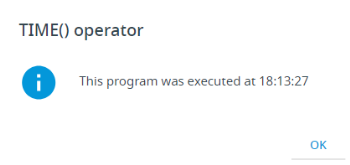TIME()
TIME() operator converts the time-of-day portion of its DATETIME operand to a character string.

The returned character string has this format - hh:mm:ss - with hh representing hours, mm representing minutes, and ss representing seconds. This format is based on the 24-hour clock.
If you supply no operand, TIME() reads the system clock and returns a character string that represents the current time of day.
For example, this example program
MAIN
DEFINE my_time CHAR(15)
DEFINE tmp STRING
LET my_time = TIME
LET tmp = "This program was executed at ", my_time
CALL fgl_winmessage("TIME() operator", tmp, "info")
END MAIN
will display a message like this:
Like values returned by the CURRENT, DATE(), DAY(), MONTH(), TODAY, WEEKDAY(), and YEAR(), the value returned by TIME() is sensitive to the time when the application was run and to the accuracy of the system clock.
